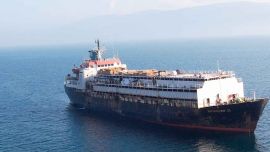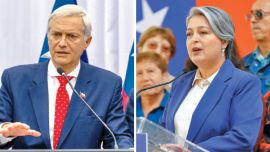The match had to be postponed twice after River fans attacked the Boca team bus, and CONMEBOL, the South American football federation ultimately chose to relocate the clash to Spain.
But this phenomenon is not confined to just one country in the region, where several others also wrestle with the scourge of football-related thuggery. It’s a blight that has left hundreds of people dead and which transcends local rivalries and street brawls among fans, into organised crime and corruption facilitated by politicians.
“In Argentina, people tend to think that football violence is monopolised by the barras bravas,” explained sociologist Diego Murzi.
The member of the Let’s Save Football (Salvemos al Futbol) charity sid that “what is overlooked is that in Argentina there is a football culture in which violence is [seen as] legitimate, and not just by the hooligans, but by all the sectors that participate.”
Even so, football violence is fed by illicit businesses run by hooligan organisations.
In Paraguay, for example, “behind the violent fans there are drugs, prostitution” and business relations between them and “both sporting and political leaders,” said Eugenio Ocampos, an expert with the Paraguayan Public Ministry.
Football hooligans in Argentina are deeply ingrained in the myriad of money-making businesses that operate around football matches. Hooligan groups use their criminal connections “to obtain benefits in the resale of tickets, control of parking, food stalls within stadiums, participation in political and union activities, and activities in the world of crime,” said Murzi.
In Colombia, hooligan groups are even involved in money-laundering.
“The fans operate underground where they can move certain funds that allow them to keep themselves going, both with legal and illegal businesses,” said sociologist John Alexander Castro, a football violence expert at Colombia’s national university.
Those groups organise sports events, arrange the sale and distribution of replica shirts, and also sell drugs.
The phenomenon is slightly different in Brazil, where the “groups linked to organised crime and drugtrafficking infiltrate organised supporter groups,” said Mauricio Murad, author of a book on football violence.
He said that the organised criminals are the ones who provoke fans into committing acts of violence.
Unlike the Argentine groups, these criminals “have no relation with the clubs but join the supporters groups as fans so that they can sell drugs and weapons.”
The battle to rid football of these destabilizing elements that sow carnage is hamstrung by police collaboration, said Murzi.
In Argentina, “all the police know the hooligans, it suits the police for them to exist. They run a ton of businesses alongside the hooligans.”
Murzi said the police are “contributing more to the problem than helping to solve it.”
There are some efforts to rein in the criminal and hooligan groups. But Murzi isn’t so hopeful for Argentina, where “the approach is always the same, thinking that violence is carried out by a group of savages, nutters, idiots or misfits.
“That’s what the press and authorities call it but it’s an over-simplification. The hooligan groups of Boca and
River were decapitated twice and
nothing has changed.”
related news
by BY MAURICIO ARBILLA





















Comments